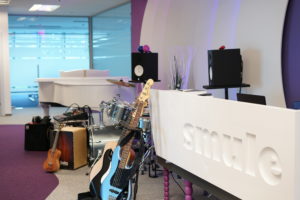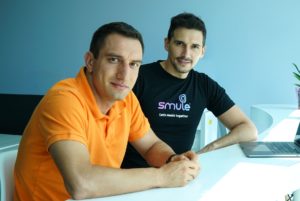The Curious Case Of The Ten Years Old Startup That Makes 50M People Sing Together Every Month

White piano, a couple of guitars, drums next to the reception desk, a glass meeting aquarium called Eminem on the right, and another one, named after the famous folklore singer Valya Balkanska, on the left. This is the first picture one sees entering into the office of Smule, the company behind the music platform reaching 50m users monthly.
“Here, you sometimes see engineers and creatives spontaneously starting to sing together and jam in the middle of the day,” says Dobri Dobrev, VP of engineering. It sounds as if this was a scene from a Silicon Valley startup office.

Yet, here we are on the 8th floor of a business tower in the suburbs of Sofia, where 100 people work for one of the rare for the country b2c tech companies. “Even though we were founded in 2008, we still consider ourselves as a startup,” smiles Antoni Stavrev, Director of Engineering Mobile in Bulgaria. The tech company that originally comes from the US, and launched its Sofia operations last year, develops mobile applications that allow people from pretty much everywhere to sing and make music together in real-time or recorded.
Furthermore, Smule is also one of those rather rare cases of US startups, where Bulgaria is not only the engineering outlet but also has fully operational, creative, and marketing teams. The local site has ambitious goals to grow the team to 140 people by the end of the year.
Sing for the moment
As the well known Eminem song suggests, Smule is also about singing for and at the moment. Throughout the years, the company has developed 20+ apps, but Smule (previously known as Sing!Karaoke) is the one that went through the test of time and gathered a real community around… well, basically singing.
“Our community and users consist of people who want to express themselves. The connection is so deep that people sometimes get together and find each other through Smule. This is a platform that connects people beyond age groups, professions, or geographies,” explains Stavrev. According to him, a regular user would spend a couple of hours weekly on the platform while usually apps fight to get their users’ attention for minutes. Not bad performance having in mind that one of the most time-consuming apps Instagram is used on average for 6 hours weekly. This is why Smule needs to process around 35 petabytes of user-generated content and data daily.
And to be able to do so, and serve hobby or professional musicians with this experience, Smule had to build a solid foundation. Even though the team was not too keen on talking about their innovation quite particularly, we managed to count over 60 patents filed by Smule in the past several years. Some of them are for technologies allowing people singing together with no latency regardless of their internet quality, others for mixing vocals of geographically distributed singers, or even for automatic conversion of speech into song, rap (the company also runs a rapping app).
“What we can share is the recent release of LiveJam, a feature that allows people to sing live together with no delays, even if they are on the two ends of the world whose Android version was completely developed in Sofia,” Dobrev gives a hint. A significant part of Magic Piano and AutoRap – the second and the third most popular apps of Smule Inc. are also developed in Bulgaria.

For this company, it all comes down to making people who’d love to sing or jam feel like they are physically together with their community audibly and visually, without sensing technological limitations. In a nutshell, Smule gives its users a gamified recording studio, lets them pick songs, record it solo or with someone else, edit the record with a built-in tool. The company has also invested in recording famous musicians a regular user could duet with. Something the Sofia office is also keen on doing and has already started hosting is rising local bands. And to unlock some of the premium features like sing a hit song or even sing it with the original performer users need to pay a subscription.
The global music village
To many, including the author of this article, and especially in an engineering destination for b2b enterprise solutions like Bulgaria, this business might sound a bit too far away. Yet, there is actually a big market for such services. The size of the karaoke application market is a well-kept secret, that our research couldn’t reveal, but we managed to find close to ten companies, including one owned by the Chinese giant Tencent in the space.
Asia is one of the largest market for Smule, followed by the US, Europe, and Latin America. “We even have several thousand downloads in Bulgaria,” Dobrev says.
Smule was founded in 2008 by US engineer and entrepreneur Jeff Smith and Stanford assistant professor Ge Wang as a mobile app developer, starting out with music transmitting iOS application called Ocarina, even before the AppStore of Apple. Throughout the years it turned in to a music platform that has attracted $176.5M of venture capital, according to Crunchbase, as the founders realized there’s something more. “There was a community forming around our karaoke app. Right now the power of Smule is not the app itself, its the community,” Dobrev explains.
Mission Bulgaria
Being a global b2c brand that develops a community, however, requires not only great technology but also a type of culture that lives in diversity. This is also one of the key elements in the team of Smule.“Being an international company makes it so important for us to have diversity here. We have foreigners, and 15% of our employees are actually Bulgarians who came back to Bulgaria,” tells us Anton Stavrev. Bringing talent to and back to Bulgaria is also the mission CTO Eric Dumas has set for the Sofia office, which is expected to grow to 140 people by the end of the year.
Furthermore, the team has started an initiative to host Bulgarian musicians and bands in their inhouse studio for small concerts, and thus help them gain more audience and community via Smule’s platform.
Q&A
Eric Dumas, the CTO of Smule is French who’s been living in Bulgaria for 18 years. His latest position was CEO of Vayant Travel Technology, a Bulgarian flight-search company that was acquired by the US company Pros in a $35M deal in 2017. One of the reasons for Smule to open up its office in Sofia is the historical relationship between Eric and Smule co-founder Jeff Smith and President Bill Bradford as they created the IT company Tumbleweed in Sofia in early 2000s which was a positive experience.
Trending Topics: How did Smule end up having an operations office in Sofia?
Eric Dumas: Why not? Why would we keep Bulgaria only an engineering location, while there’s so much potential and diverse talent here? There’s a great movie industry with post and preproduction, there’s so much creative energy here, that we want to leverage. This is a great source of talent.
In Bulgaria, there are also great musicians. Smule at the end of the day is a music company. We also hire sound engineers from the local ecosystem. From time to time we host Bulgarian musicians. And while having fun in the office, we try to give them the spotlight and enable them to produce through the platform.
What is your vision for the Bulgarian office?
We want to do unusual things and know there’s no limitation. Apart from this, one of our missions is to facilitate to bring back people to the motherland.
Read also:
Stories of hardcore tech business people and their creative side projects





























